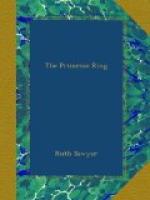“And so you make believe that Trustee Day isn’t really bad?”
“Oh dear, no! But I keep believing it’s going to be much better. Did you ever think what it could be like—if the trustees would only make it something more than—a matter of business? Why, it could be as good as any faery-tale come true, with a dozen god-parents instead of one; and think of the wonderful things they could do it they tried. Think—think—and, oh, the fun of it!”
She broke off with a little shivering ache. When the picture became so alive that it pulled at one’s heart-strings, it was time to stop. But the next moment she was laughing merrily.
“Do you know, when I was a little tad and couldn’t sleep at night with the pain, I used to make believe I was a ‘truster’ and say over to myself all the nice, comforting things I wished they would say. It began to sound so real that one day I answered—just as if some one had said something pleasant.”
“Well?” interrogated the House Surgeon, much amused.
“Well, it was the Oldest Trustee, of course; and she raised those lorgnettes and reminded me that a good child never spoke unless she was spoken to. I suppose it will take lots and lots of magic to turn them into god-parents.”
“Look here,” and the House Surgeon reached across the desk and took a firm, big-brother grip of her hands, “faery-tales have to have stepmothers as well as godmothers—think of it that way. And remember that those kiddies of yours were never born to ride in pumpkin coaches.”
“But I’m not reaching out for faery luxuries for them. I want them to be children—plain, happy, laughing children—with as normal a heritage as we can scrape together for them. All it needs is the magic of a little human understanding. That’s the most potent magic in the whole world. Why, it can do anything!”
A little-girl look came into Margaret MacLean’s face. It always did when she was wanting anything very much or was thinking about something very intensely. It was the hardest kind of a look to resist. She had often threshed this subject out with the House Surgeon before; for it was her theory that when a body’s material condition was rather poor and meager there was all the more reason for scraping together what one could of a spiritual heritage and living thereby.
“And don’t you see,” she had urged, at least a score of times, “if we could only teach all the cripples to let their minds run—free-limbed—over hilltops and pleasant places, their natures would never need to warp and wither after the fashion of their poor bodies. And the time to begin is in childhood, when the mind is learning to walk alone.”




